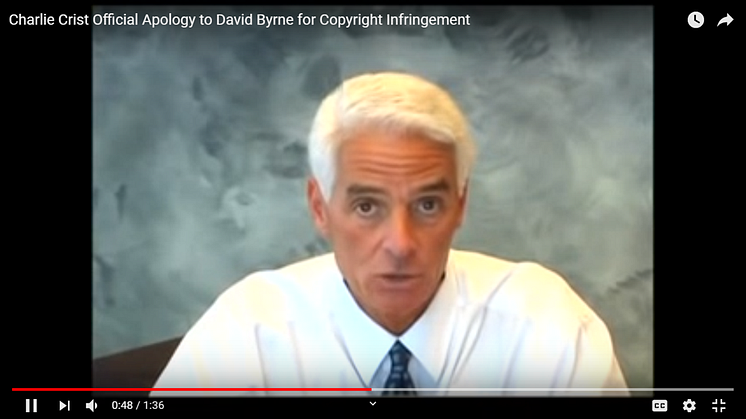
News -
The cat-and-mouse game between politicians and musicians
Politicians are playing songs at their rallies, sometimes without permission, and the musicians are getting fed up with it.
This tends to happen to conservative politicians, who are not aligned with popular musicians who are frequently left-leaning.
Donald Trump, a divisive politician whose rallies have featured songs by Neil Young, Rihanna and Pharrell Williams, has received letters from them telling him to stop using their songs.
Rihanna and Axl Rose are the latest musicians to criticize politicians for using their music at campaign events. Rihanna found out the Donald Trump rally at Chattanooga was blasting her song “Don’t Stop the Music”. The singer has sent a cease-and-desist letter to Donald Trump.
She joins a long list of musicians such as Pharrell Williams, Steven Tyler, Twisted Sister, Neil Young, Adele, Elton John, Rolling Stones, and the Prince estate, who have warned Donald Trump not to play their music at his rallies.
Go through enough news and you will detect a pattern here, a game of cat-and-mouse: a politician uses music by artist, artist finds out about it and sends a cease-and-desist letter, and the politician complies.
But sometimes the politician has the permission to use the songs at his rallies, through blanket licenses.
Axl Rose of rock band Guns N’ Roses said he had formally denied Trump permission to use their music after finding out that Trump played “Sweet Child ‘o Mine” at a rally in West Virginia on 2 November. But Rose said Trump is not doing anything illegal. Rose explained: “Unfortunately the Trump campaign is using loopholes in the various venues’ blanket performance licenses which were not intended for such craven political purposes, without the songwriters’ consent.”
The loophole Rose was talking about, blanket licenses, allows venues to play a portion or complete repertoire of songs for a flat annual fee, without tracking nor reporting each individual song every time it is played. Radio stations and venues where music is frequently played during group events typically acquire blanket licenses for convenience.
So most of the time it is the venue that has secured a blanket license to play songs at political rallies held there. Which means music secured by a third party can be used to promote politicians. Musicians who want to avoid that would have to remove their songs from the catalogue of the licensing company, which means removing the song from being able to be played anywhere, thereby losing potential income. Which explains why most musicians grumble online about Trump using their songs, and do not do anything more beyond sending a cease-and-desist letter.
Musicians might hesitate to sue as they might end up having to pay the legal fees if they lose. This is not a new dilemma for musicians, and they sometimes use other ways to disassociate themselves from the politicians.
In a case of crossed wires, Ronald Reagan used Bruce Springsteen’s “Born In The USA” as his campaign anthem in 1984, unaware of Springsteen’s sarcastic message behind the song, which is about the negative treatment Vietnam veterans received upon returning to America. Mistaking the song as an expression of patriotism, the Reagan campaign adopted the song. Springsteen responded by making a music video of his song featuring shots of returning veterans in line for payday loans, leaving no room for interpretation of what his song was really about.
George H.W. Bush was asked in 1988 to stop using Bobby McFerrin’s “Don’t’ Worry, Be Happy” as his campaign theme song. Bush responded by inviting McFerrin to accompany him on the campaign trail and to have dinner with him, but McFerrin refused, citing he was a committed Democrat. Bush started using Woody Guthrie’s “This Land Is Your Land” instead.
But some musicians have gone beyond name-calling and have successfully sued political offenders.
In 2010 David Byrne sued Charlie Crist, then governor of Florida, for using the Talking Heads’ 1985 song, “Road To Nowhere” without permission. Crist had used the song in an attack video against his rival Marco Rubio. Byrne sought US$1 million in damages but both parties eventually settled with an undisclosed sum, and the provision that Crist make an apology video that was put up on YouTube. Crist acknowledged in the video that he did not secure permission or a license to use the song, and pledged that he would not repeat his mistake in the future. David Byrne was quoted by Billboard: "It’s not about politics, it's about copyright and about the fact that it does imply that I would have licensed it and endorsed him and whatever he stands for."
David Byrne’s method of resolution is different from other artists in that he got the offender to make a video and upload it to YouTube. But Byrne is a well-known musician who has the financial means to launch a lawsuit. There is no way to prevent someone else from stealing a Creator’s ideas and running with it. Creators can at least ensure they have documentary proof of their ideas, and PitchMark their material before presenting them or making them public.
